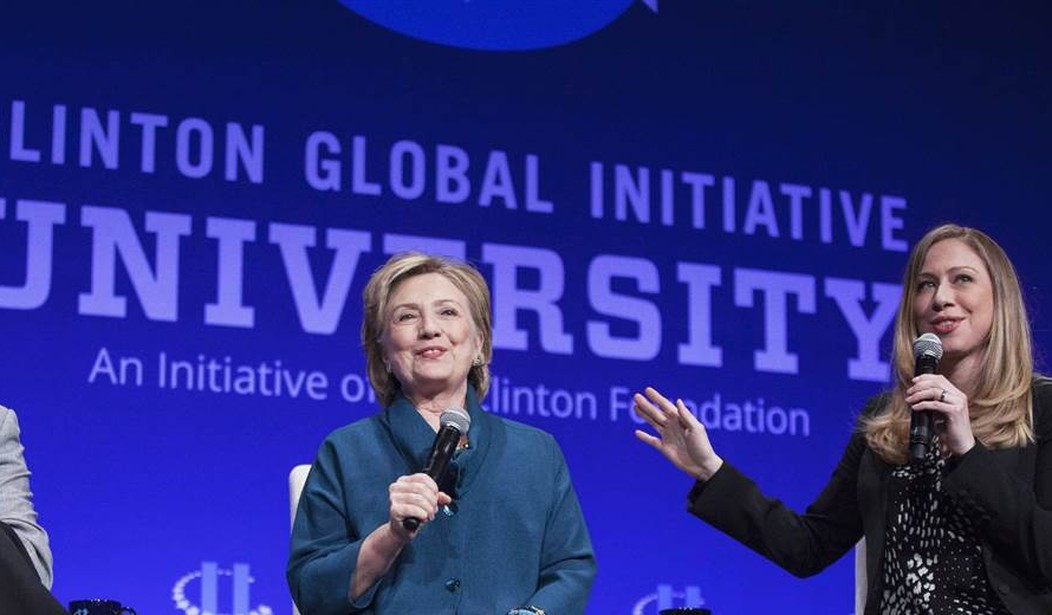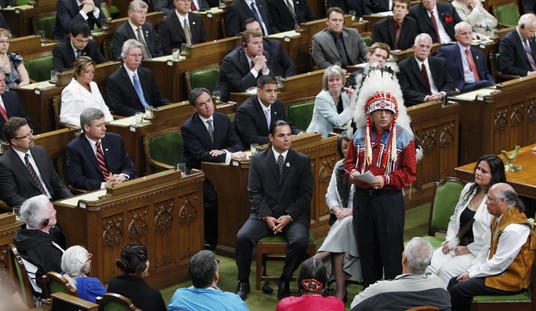There is not going to be any criminal prosecution of Hillary Clinton.
Get used to the idea. It’s not going to happen. Yes, hopes are yet again stirring that there might at long last be a reckoning for this living, breathing monument to mendacity and Washington-insider corruption.
Don’t get swept away. It’s bad for your blood pressure … and it’s futile.
The latest revelations about Clinton Foundation pay-to-play shenanigans are the most outrageous thing since, well, the prior revelations about Clinton Foundation pay-to-play shenanigans. Judicial Watch, which tries to do the oversight the Republican Congress won’t do, has uncovered 44 more Clinton “private” emails related to State Department business that Mrs. Clinton failed to preserve and tried to destroy in violation of federal law. They illustrate — which is to say, they re-illustrate the long established reality of — the incestuous relationship between the State Department under Mrs. Clinton’s stewardship and the “charitable” foundation set up by Bill and Hillary Clinton to monetize their political influence.
In a nutshell, then-Secretary of State Clinton, through her two closest aides, Cheryl Mills and Huma Abedin, used her influence to benefit top Clinton Foundation donors with access to political movers and shakers, international economic opportunities, and possibly government employment. The foundation donors gave copiously, enabling Bill and Hillary Clinton to earn tens of millions of dollars in speaking fees, live off the fat of “charitable donations” (comparatively little of which actually went to humanitarian relief), and turn the foundation and its offshoots (like Teneo Consulting) into an administration-in-waiting with high-paying jobs for Clinton cronies. Some, like Ms. Abedin, managed to draw foundation salaries even as they drew State Department paychecks underwritten by taxpayers.
And of course, because these are the Clintons we’re talking about, there is an even seamier underside to the barely camouflaged corruption. One of the Clinton donors for whom the Clinton State Department was pulling strings was Gilbert Chagouri. He’s a shady Lebanese-Nigerian whose family businesses thrived under Nigeria’s military dictatorship and who later had to pay a $66 million settlement to avoid prosecution on the millions he allegedly stole from the country. Naturally, he has donated somewhere between $1 million and $5 million to the Clinton Foundation, in addition to pledging $1 billion — that’s billion with a ‘b’ — to the Clinton Global Initiative.
As you would expect, he’s also behind one of the innumerable Clinton speech-making paydays — in this instance, as the Wall Street Journal’s editors note, it was $100,000 for Bill to spread his pearls of wisdom in the Caribbean.
Does all this stink to high heaven? Well, yes … but “stinks to high heaven” would not necessarily amount to a criminal case, even if you had a Justice Department that was open to the idea of prosecuting Mrs. Clinton.
As it happens, the incumbent attorney general — who was first appointed to a prestigious U.S. attorney position by Bill Clinton, and who just happens to be in line to keep her job if Hillary Clinton is elected president — would not approve an indictment of Hillary if the latter robbed a bank at high noon on national television.
Look at it this way: Mishandling classified information in a grossly negligent manner is a crime very straightforward to prove, and the evidence against Mrs. Clinton was overwhelming. The only felony that may have been more of a slam-dunk in Mrs. Clinton’s case involves her destruction of thousands of government records. Yet, the Justice Department and the FBI chose not to indict her.
By comparison, political corruption is very difficult to prove, especially if it is of the inchoate variety exemplified by the Clinton scheme — the peddling of access and influence under an intricate web of charitable giving, political consultancy, and speaking engagements.
Moreover, these hard-to-make criminal cases have been made all the harder by the Supreme Court’s unanimous ruling just a few weeks ago in McDonnell v. United States. There, a mountain of evidence demonstrated that a donor provided $175,000 in gifts and personal loans to the former governor of Virginia (and his wife) in exchange for political influence. Yet, the justices held that the governor’s opening of doors to key decisionmakers and less-than-subtle pressuring on behalf of the donor was insufficient to establish a prosecutable case of bribery and corruption. (The case involved an unsuccessful effort to convince Virginia’s public universities to perform research studies the donor needed in order to market a nutritional supplement.)
There are reasons good, bad, and obvious for the difficulties these corruption cases pose for prosecutors. To start with the obvious, the statutes are written by the politicians against whom they will be applied, so there is a certain built-in looseness in the joints. While some of that is cynical, there is also some justification in constitutional and policy considerations.
In representative government, elected officials are supposed to be influenced by the concerns of constituents, and voters must be free to provide financial and other support to the candidates who will fight for their concerns if elected. It is challenging to write laws targeting corrupt pay-to-play arrangements without sweeping in legitimate campaign support and representative government. If the laws we have are too expansively construed, we come dangerously close to what the framers sought to avoid: an executive branch check against legislative efforts that reflect legitimate concerns of citizens.
Of course, if the laws are too narrowly construed, you end up with what we see in the McDonnell case: a free pass given to palpable (albeit ultimately unsuccessful) bribery — which signals to elected officials that they can shake down constituents and push the agendas of well-paying insiders with impunity.
That is everything that everyone claims to hate about Washington. But here’s the thing: We keep sending the same people there over and over again — now, even appearing poised to elect to the nation’s highest office Mrs. Clinton, whose only known accomplishment is the raising of pay-to-play, wheeler-dealer government to an art form.
The Supreme Court, in the McDonnell case as in the Obamacare cases, seems to be conveying a blunt political message clothed in legal parlance: “If you, the American people, do not want corrupt public officials and ruinous public policy, stop voting for them. Don’t expect us judges to do your heavy lifting for you.”
Concededly, this message would be a lot easier to take if the courts were promoting liberty across the board rather than imposing elements of the “progressive” political program. Nevertheless, it is worth the look at the mirror. If someone as squalid as Hillary Clinton is a viable political candidate, that is not a failure of our legal system. It is a failure of our culture.









Join the conversation as a VIP Member